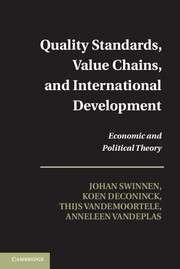Book contents
- Frontmatter
- Contents
- Preface and Acknowledgments
- 1 Introduction
- 2 Modeling Standards
- 3 Efficiency and Equity Effects of Standards
- 4 The Political Economy of Standards and Development
- 5 International Trade and Standards
- 6 Risk, Externalities, and the Nature of Standards
- 7 Endogenous Private and Public Standards in Value Chains
- 8 Butterflies and Political Economy Dynamics in Standard Setting
- 9 The Political Economy of Standards and Inclusion in Value Chains
- 10 Standards, Production Structure, and Inclusion in Value Chains
- 11 Standards, Market Imperfections, and Vertical Coordination in Value Chains
- 12 Market Power and Vertical Coordination in Value Chains
- 13 Price Transmission in Value Chains
- 14 Commodity Characteristics and Value Chain Governance
- 15 Economic Liberalization, Value Chains, and Development
- 16 Standards and Value Chains with Contracting Costs: Toward a General Model
- 17 General Equilibrium Effects of Standards in Value Chains
- References
- Index
12 - Market Power and Vertical Coordination in Value Chains
Published online by Cambridge University Press: 05 August 2015
- Frontmatter
- Contents
- Preface and Acknowledgments
- 1 Introduction
- 2 Modeling Standards
- 3 Efficiency and Equity Effects of Standards
- 4 The Political Economy of Standards and Development
- 5 International Trade and Standards
- 6 Risk, Externalities, and the Nature of Standards
- 7 Endogenous Private and Public Standards in Value Chains
- 8 Butterflies and Political Economy Dynamics in Standard Setting
- 9 The Political Economy of Standards and Inclusion in Value Chains
- 10 Standards, Production Structure, and Inclusion in Value Chains
- 11 Standards, Market Imperfections, and Vertical Coordination in Value Chains
- 12 Market Power and Vertical Coordination in Value Chains
- 13 Price Transmission in Value Chains
- 14 Commodity Characteristics and Value Chain Governance
- 15 Economic Liberalization, Value Chains, and Development
- 16 Standards and Value Chains with Contracting Costs: Toward a General Model
- 17 General Equilibrium Effects of Standards in Value Chains
- References
- Index
Summary
Introduction
Market power and competition in value chains are important items on the policy agenda around the world. In many value chains there are stages where a few firms dominate the market. The exercise of market power may lead to higher consumer prices and lower supplier prices, and therefore economic distortions and reduced consumer and/or supplier welfare. Claims that large, often multinational companies such as global retailers and food companies are driving up consumer prices and/or depressing local supplier prices have been made in many countries. For example, in 2006, demonstrators outside the Walmart shareholders’ meeting in Mexico City protested against “the low wages Wal-Mart pays its employees, the low prices it pays to its suppliers” (Globalexchange.org, November 14, 2006). Also Monsanto, the world's largest seed company, has been frequently accused in the press of “using monopoly powers to drive up [seed] prices and stymie competition” (e.g., Reuters, January 8, 2010).
However, the effects of market concentration on the exercise of market power and the associated welfare effects are less straightforward than often claimed. For instance, increased concentration could lead to economies of scale, resulting in efficiency gains for society. Moreover, increased concentration among retailers may lead to “countervailing power” in their bargaining with large processing companies; these lower prices could in turn be passed on to consumers. Mirroring these ambiguous theoretical predictions, the empirical literature shows little consensus on the welfare effects associated with market concentration.
The issue of market concentration is also important in relation to standards. Large multinational companies with dominant market positions have introduced their own private standards which, because of their size, have become de facto mandatory for many suppliers (Henson, 2006; Smith, 2009). Moreover, suppliers have often been confronted with a limited number of buyers willing (or able) to reward high standards, for example, because standards (and the associated quality premiums) are company-specific. Finally, high-standards product perishability may reduce supply elasticity and therefore reduce supplier bargaining power (Sexton and Zhang, 1996).
In this chapter we analyze the impact of market concentration and, conversely, competition in value chains when there are factor market imperfections and vertical coordination. We first briefly review some of the literature on the effects of increased concentration on both consumers and suppliers. Because there is a huge literature on this topic, we focus on concentration in retailing, an issue that has attracted much attention recently.
- Type
- Chapter
- Information
- Quality Standards, Value Chains, and International DevelopmentEconomic and Political Theory, pp. 193 - 207Publisher: Cambridge University PressPrint publication year: 2015



